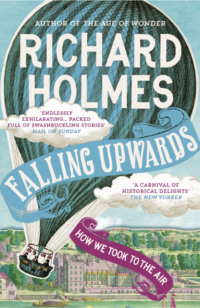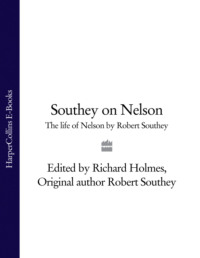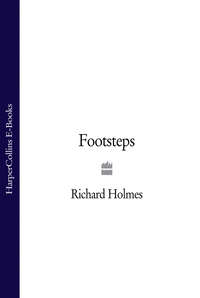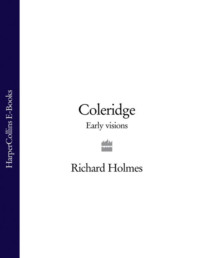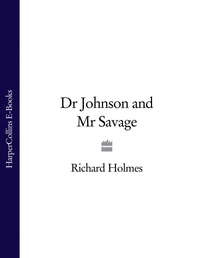
Полная версия
Dr Johnson and Mr Savage
It is worth considering here another fiction. What might an imaginary obituarist also have made of Johnson at this period? Suppose Samuel Johnson had also died at about forty years old, say in the summer of 1749 when he had been in London for just over ten years? This is Johnson more than a decade before he met Boswell. This is Johnson still virtually unknown, beyond a small circle of Fleet Street booksellers, when he has just published his first signed work, The Vanity of Human Wishes. This is the young Samuel Johnson that Savage would have recognised, but that we, looking backwards through history and Boswell’s biography, might find difficult to imagine at all. This is how Death might have briefly framed his portrait at that date:
Mr Samuel Johnson: poet, playwright and sometime political journalist. News has just reached us in the London mails, of the untimely death of Mr Samuel Johnson, late of the city of Lichfield, at his house at Gough Square, Fleet Street, London, of a sudden Apoplexy.
He was the son of Michael Johnson, bookseller and stationer of Sadler Street and Market Square; and elder brother of Nathanial Johnson, who continued the family business until 1737 in this city. Mr Johnson’s Learning and Eccentricities will be well remembered, which led him to abandon the useful paths of Pedagogy for the ephemeral pursuit of Letters in the capital city, where he found little Success. He was attached in various capacities to the Gentleman’s Magazine of Mr Edward Cave, where he undertook extensive but anonymous Work, most notably the reporting of Parliamentary affairs in the scurrilous rubric of ‘Debates in the Senate of Lilliput’ which he continued for three or four years. He is believed to have published several anonymous Poems and political Pamphlets, of a generally Jacobite tenor and in Opposition to the late Ministry of Mr Walpole.
At the time of his Death, perhaps hastened by Poverty and Overwork, he was engaged in a delusory Scheme to compile by his singular efforts a General Dictionary of the English Language, an enterprise more rationally undertaken in France by a Committee of scholars labouring over many years. The tribulations and disappointments of his Life have been summarised in a recent poetical satire, ‘The Vanity of Human Wishes’, which some may take as his own Elegy.
Samuel Johnson was born in Lichfield on 18th September 1709, and taken by his Mother to London at the age of three years to be touched by her Gracious Majesty Queen Anne for the Evil, a Scrofula infection that marked him in a sad and monstrous Manner for the rest of his life. He was nearly blind in one Eye, and suffered from an unhappy series of nervous Spasms, which rendered him permanently unsuitable for the gracious departments of Society, and nullified many of his efforts to obtain Advancement. To these physiological Causes may be ascribed a melancholy of Temper, and irritable dogmatism of Address, which rendered him at times restless, willful, and barbarous. A brooding spirit of Opposition marked many of his proceedings; he felt the pain of Existence, and perhaps unduly resented the Comforts of Privilege, Fortune, or Power. Of his Learning, there can however be little Doubt.
He achieved Pre-eminence among his peers at the Lichfield Grammar School with remarkable celerity; and in October 1728 proceeded to Pembroke College, Oxford, with a reputation for Scholarship that was little short of prodigious; but after fourteen months was forced to withdraw owing to the Business-failings of his father, who died in 1731 leaving him no Patrimony. A period of lassitude and solitary Study now ensued, alternating with unsuccessful attempts to establish himself as a Schoolmaster at Market Bosworth and at Birmingham.
At last, in what might appear a strange fit of Optimism or of Despair, he married Mrs Elizabeth Jervis Porter, the widow of a Birmingham woollen-draper, the Mother of three children and a Woman over twenty years his senior, on 9 July 1735 at St Werburgh’s church, Derby. This Union is said to have been the cause of great Solace to Johnson, and of great Merriment to his Friends. He invested his Wife’s dowry of some £600 in the venture of a private School at Edial, Lichfield, which failed within two years, leaving him without Resource. He was therefore obliged to seek some other Means of Support, and having no Profession, became, by Necessity, an Author.
Removing precipitously to London in the spring of 1737, Mr Johnson sought Employment among the denizens of Grub Street, while attempting to finish ‘Irene’, a blank-verse Tragedy of the passions, incommodiously located in Constantinople at the time of the Turkish ascendancy. He is said to have been greatly attached to his heroine, Aspasia, who resists the heathen Blandishments of the Sultan Mahomet, confirming thereby her Virtue, her Religion, and eventually the Dictates of her Heart.
The insolence of Power, and the Temptations of the animal Passions, appear to have been a constant theme of Mr Johnson’s meditations at this period of his Life, and may reflect upon his own unhappy Situation. But finding himself now no more successful as a Tragedian, than formerly as a Schoolmaster, he at length established a connection with the Gentleman’s Magazine where he earned his Bread as a low writer of Translations, Reviews, Catalogues and Commentaries over the ensuing decade. Throughout these years he knew great Poverty, and his Union with Mrs Johnson is rumoured to have been at Times interrupted.
The spirit of Discontent, if not of Subversion, is revealed in his Imitation of Juvenal’s Third Satire on Rome, which he published anonymously as ‘London’ in 1738; and his Pamphlets in prose and verse directed against the Ministry. In 1744 he published through Mr Dodsley a remarkable Apologia for the Life of the notorious Mr Richard Savage, the self-styled Volunteer Laureate and claimant to the Rivers title, a man renowned equally for his Poetry and his Profligacy.
Mr Johnson’s familiarity with this Gentleman and his London haunts, at the very Nadir of his misfortunes, may indicate something of his own Circumstances. The Performance is executed with both Tenderness and Rigour, as if the Author was to some degree at War with his own Nature and Outlook in the judgement of his unhappy Friend. The Work, though cast in the ephemeral genre of commercial Biography, has received Praise in many quarters including the Approbation of Mr Henry Fielding (whose History of Tom Jones: A Foundling now lies before the World); and it may be counted among the most Successful and Diverting that Mr Johnson was destined to produce.
Disappointed in his literary Prospects, disheartened in his political Hopes, and perhaps embittered by his personal Affairs (but we make no Windows into the human Heart), Mr Johnson threw himself at last into the harmless drudgery of his English Dictionary, for which he undertook a contract in 1746, with a Chimerical fervour, and established himself on Credit at Gough Square with Mrs Johnson who steadily sought refuge from the World in Novels and Medicines. Turning once more to his favourite Juvenal, Mr Johnson now imitated the Disillusion of the Tenth Satire, in his poem ‘The Vanity of Human Wishes’, which he is believed to have composed while Walking in the country lanes of Hampstead in a delusory Attempt to escape the Toils of the City which had so fatally ensnared him.
The last concussion to his Hopes occurred this spring, when his long meditated Tragedy of Irene was mounted in Drury Lane by his Friend Mr David Garrick (one of the truly distinguished sons of Lichfield), to be received only with a Tepid expression of Politeness by the Town. The fatal Illness that now struck him down, at the age of Forty, may perhaps be assigned as much to Weariness and melancholy of Mind, as to premature Decay of his ungainly and damaged Body.
He remained throughout a devout and convinced Christian, and found that Solace in Heaven which he could not find in the World. Perhaps he composed an Elegy for himself, and for his Grub Street familiars such as Mr Savage, when he wrote in The Vanity of Human Wishes:
Deign on the passing World to turn thine Eyes,
And pause a while from Letters, to be wise;
There mark what Ills the Scholar’s Life assail,
Toil, Envy, Want, the Patron and the Jail.8
Chapter 2 Love
When Johnson first came to London in 1737 he was twenty-seven years old; and Savage (as far as we can tell) was nearly forty. Johnson was young, unknown and untried; Savage was ageing, experienced and disreputable. We have to begin to imagine a relationship of mentor and pupil between the two men that is unlike almost anything in Johnson’s later career, or in that part of it recorded by Boswell. Savage can be seen as a sort of urbane Mephistopheles, Johnson as a youthful Faust.
The friendship lasted at most only two years, but it seems to have been of great emotional intensity. When they eventually parted, in July 1739, Johnson says that he had ‘Tears in his Eyes’. It is invariably said by Johnson’s own biographers that the man who was weeping was Savage, not Johnson; thereby suggesting that Johnson was relatively unmoved. But this may not be the case. Johnson himself draws special attention to the moment of parting by making it one of the few places in his Life of Savage where he deliberately introduces himself as part of Savage’s story. He emphasises the pathos of the moment with unusual explicitness.
Savage had resolved to abandon London for rural Wales to live frugally, and salvage his writing career. ‘Full of these salutary Resolutions, he left London, in July 1739, having taken Leave with great Tenderness of his Friends, and parted from the Author of this Narrative with Tears in his Eyes.’1
Tears in whose eyes? The sentence is curiously ambiguous, or deliberately so: the punctuation suggests Savage’s eyes, but Johnson’s dramatic introduction of himself in the final clause seems to claim the tears as his own. It is almost as if Johnson was impelled as a friend to bear witness to his own tears; but was embarrassed as a biographer to admit them in public This embarrassment at the strength of his feelings for Savage, when he later looked back at it, provides us with a first clue to the whole story.
When Johnson came to correct the second edition of the Life in 1748, he noted carefully in the margin next to the ‘Tears in his Eyes’ an explanatory phrase: ‘I had then a slight fever.’ This seems to imply that Johnson was indeed recalling his own tears and emotion at losing Savage, but he felt awkward doing so, and subsequently wished to dismiss them as mere physical weakness, as temporary illness. But in this sense his whole intimacy with Savage may have been something of a young man’s fever. It was hectic, intense, continually menaced by Savage’s poverty and instability, and by Johnson’s own struggles to establish himself professionally in London. Johnson seemed to conceive of their time together as something dreamlike, tidal like the River Thames; a friendship of arrivals and departures in the great city.
In his poem London, Johnson invests just such an imagined parting with a strange, solemn ritual of kissing the ground, bathing the whole moment in a bright silvery light, reflected from the shining water, of romantic intensity:
While Thales waits the Wherry that contains
Of dissipated Wealth the small Remains,
On Thames’s banks, in silent Thought we stood,
Where Greenwich smiles upon the silver Flood:
Struck with the Seat that gave Eliza birth,
We kneel, and kiss the consecrated Earth …2
Nothing could be further from the atmosphere of Boswell’s familiar tale of Johnson and young David Garrick riding to London to seek their fortunes in March 1737. Here, by contrast, is the touch of brisk heroic comedy like a picaresque adventure out of a Fielding novel. ‘Both of them’, says Boswell, ‘used to talk pleasantly of it’, and embellished it suitably as the years went by.
They were cheerful, poor, devil-may-care. Garrick would say that they had only one horse between them, and ‘rode and tied’ – that is, each one riding ahead in turn, tying up the horse to a tree or gate, and walking on till the other overtook and performed the next relay, as if they were gypsies. Johnson would add that his total finances were ‘two-pence half-penny’. Garrick once mockingly challenged this in Boswell’s hearing: ‘Eh? what do you say? With two-pence half-penny in your pocket?’ – Johnson: ‘Why yes; when I came with two-pence half-penny in my pocket, and thou, Davy, with three half-pence in thine.’ It became a favourite party piece, and passed into the Boswellian legend.
They took their ‘precepts of economy’ from an Irish painter, dined once a day at the Pine-Apple Coffee-house in New Street off the Strand for eight pence, and paid formal visits on ‘clean-shirt-days’ only. When Johnson first applied for literary work at a bookseller’s in the Strand, the proprietor Mr Wilcox ‘eyed his robust frame attentively’ and then suggested he take a job as a vegetable porter in Covent Garden.3
But these picturesque details, lovingly gathered by Boswell, mask a much bleaker truth. Johnson was a failed schoolmaster, who had spent most of his wife’s inheritance, and gone off to London with a teenage pupil in a desperate last attempt to recoup his fortunes. Garrick had a definite plan: to apply to Lincoln’s Inn, and if that failed to stay with his actor-brother Peter. He was also due to inherit a legacy of a thousand pounds, sufficient to make him independent.
Johnson, by comparison, was adrift in the capital. He had the unfinished manuscript of his tragedy Irene, and an idea of applying to the Gentleman’s Magazine for hack-work (it had been refused previously, in 1734). He also carried a kindly but useless letter of recommendation from his friend Gilbert Walmsley to the headmaster of Colson’s Academy, a fellow native of Lichfield. Omitting Johnson’s personal circumstances, Walmsley wrote: ‘Mr Johnson [is] to try his fate with a Tragedy, and to see to get himself employed in some translation, either from the Latin or the French. Johnson is a very good scholar and poet, and I have great hopes will turn out a fine tragedy-writer. If it should any way lie in your way, doubt not but you would be ready to recommend and assist your countryman.’4
This left out a good deal about the difficulties of Johnson’s character and circumstances.
The young Johnson of Lichfield may have been ‘a very good scholar and poet’ potentially, but so far his professional achievements in either field had been minimal. At twenty-seven he had published nothing except some desultory essays in the Birmingham Journal and a pedestrian translation of Lobo’s Voyage to Abyssinia. The translation had been dictated to his friend Edmund Hector, while Johnson lay in bed too depressed to go to his desk.5
His scholastic career was equally undistinguished. His failure to complete a degree at Pembroke College, Oxford, in December 1729 (because of his father’s poverty, which had caused him endless humiliations) virtually destroyed his chances of a good grammarschool post or headmastership. Combined with his physical handicaps, this produced from 1730 onwards long periods of profound, chronic depression, with days of crushing slothful inactivity. At this time he told his school-friend, John Taylor of Ashbourne, that he ‘strongly entertained thoughts of suicide’.6
Over the next six years, Johnson failed in half-a-dozen masterships in small schools scattered between Lichfield, Birmingham and Stourbridge; each time fleeing back to the houses of his friends – Walmsley, Hector, or John Taylor – for solace and domestic comforts. A final blow came in 1736, when an attempt to start his own school at Edial, two miles outside Lichfield, failed through lack of pupils renewing their fees. It was closed with the loss of several hundred pounds. This money was not his own, but belonged to his new wife.7
Johnson’s difficulties were not merely, or even largely, financial or professional. They were profound problems of temperament and physical disability. These showed in depressive episodes, alternating with bullying aggression. His immediate appearance was out-landish: over six foot tall, looming in doorways, and shambling dangerously down streets (often muttering to himself). Closer up, he was a large, gaunt, bony young man of alarming, restless movement: quite unlike the noble, rolling, monumental, almost Buddhalike figure who emerges from the later descriptions of Boswell and portraits of Reynolds. He was partially blind in one eye, and heavily scarred round the throat with childhood scrofula. He suffered from frightening nervous spasms of the arms and shoulders, and uncontrollable facial twitches.
Boswell recorded these with great accuracy and tenderness in later life, when they had become almost endearing features. Yet even he notes that the painter Hogarth, on first spotting Johnson in Richardson’s drawing-room, assumed he was a congenital idiot taken in for philanthropic reasons.8
In his late twenties Johnson was a figure of horrid fascination. Men were intimidated by him, women were both excited and repulsed, children were frightened in his presence and cruelly mocking behind his back. This disturbing, unfamiliar picture emerges from the confidential reports of several of the schools that rejected him.
The governors of Solihull, seven miles outside Birmingham, sent this reply to Gilbert Walmsley’s recommendation of Johnson for the vacant headmastership in 1735: ‘… all agree that he is an excellent scholar, and upon that account deserves much better than to be schoolmaster of Solihull. But then he has the character of being a very haughty, ill-natured gent., and that he has such a way of distorting his face (which though he can’t help) the gent, think it may affect some young lads; for these two reasons he is not approved on …’9 Boswell did not know of this report, or at any rate did not quote it.
A similar rejection came from the headmaster of Brewood Grammar School, fifteen miles west of Lichfield, in 1736. Johnson was refused the post of assistant master, ‘from an apprehension that the paralytick affection … might become the object of imitation or of ridicule, among his pupils’.10 Boswell did have this report in his archives, but omitted it from his account of young Johnson, including it only as a retrospective footnote to his moving description of Johnson’s death in 1784.
Less than a dozen letters have survived from this Lichfield period of Johnson’s life, and so it has always remained obscure. But something of that ‘haughty, ill-natured’ manner appears in his earliest attempt to find a professional opening in London. Writing to Edward Cave of the Gentleman’s Magazine in November 1734, he confidently recommends himself – an unknown, unemployed schoolmaster from Stafford – for the post of literary correspondent: ‘Sir: As You appear no less sensible than Your Readers of the defects of your Poetical Article, You will not be displeased, if, in order to the improvement of it, I communicate to You the sentiments of a person, who will undertake on reasonable terms sometimes to fill a column.’11
We particularly catch young Johnson’s voice in his bullish, and splendidly tactless, summary: ‘By this method your Literary Article, for so it might be called, will, he thinks, be better recommended to the Publick, than by low Jests, awkward Buffoonery, or the dull scurrilities of either Party.’12 The application met with a polite refusal.
Haughtiness covered not merely provincial gaucherie, but desperate loneliness and uncertainty. Johnson’s frustrated intellectual brilliance hid extraordinary emotional immaturity. This, Boswell never seems to have grasped. For him, Johnson was a sage from boyhood, a wise owl from the egg. Yet the truth seems to be that, barricaded in his large monstrous body, Johnson had the tender, awkward emotions of an overgrown child.
He depended on his friends, and needed almost to be mothered by them. In 1735, he wrote one of his few revealing letters to Richard Congreve, a twenty-one-year-old undergraduate then at Oxford. Congreve had known him briefly at Lichfield and had written a summer letter vaguely suggesting a renewal of their ‘old acquaintance’. Johnson, then twenty-six, replied with an awkward but surprisingly romantic enthusiasm. He imagines their friendship as a kind of Arcadia, from which he can flee from the hostile world.
Our former familiarity which you show in so agreeable a Light was embarrassed with no forms, and we were content to love without complimenting each other. It was such as well became our rural Retreats, shades unpolluted by Flattery and falsehood, thickets where interest and artifice never lay concealed! To such an acquaintance I again invite you …13
The way young Johnson already idealises friendship is striking. His instinct is to treat it as poetic and aphoristic ‘He may be justly said to be alone,’ he tells Congreve, ‘who has none to whom he imparts his thoughts.’ Something intensely personal emerges in the description of the true friend: one with whom a man may converse ‘without suspicion of being ridicul’d or betray’d’.14 This secret longing for companionship prepares us for Savage’s tremendous impact on his life.
The actual news that Johnson conveys to Congreve is oddly muted: ‘little has happened to me recently’, he remarks, and he will not dwell on ‘past disappointments’. The only thing worthy of note is the Edial scheme, ‘a private boarding-school for Young Gentlemen whom I shall endeavour to instruct in a method more rational than those commonly practised’. It is what he fails to tell his Arcadian friend that is most remarkable: that in less than a fortnight he is due to be married. Indeed his future wife, Elizabeth Porter, gets no mention at all. Johnson appears too embarrassed, too uncertain of himself, to mention his strongest feelings.
Yet these strong feelings certainly existed, especially in sexual matters. Johnson’s profound emotional frustration throughout the early part of his life, both in Lichfield and in London, forms a part of his literary personality that has rarely been recognised. Just as it is difficult to imagine Johnson young, so it seems impossible to imagine Johnson in love. Thanks largely to Boswell, the very phrase sounds faintly ludicrous. But Boswell, whose Journals reveal how fascinated, amused and tortured by sex he was all his own life, could never really bear to envisage his sage in equivalent throes of lust or passion. Having first met Johnson at the age of fifty-four (Boswell then being a mere twenty-three), he always projected a venerable father-figure, a moral counsellor, detached from passion. So, perhaps understandably, he could never really accept the vulnerable, tender and romantic side of ‘the Great Cham’, in his far-distant youth. This has subtly affected our view of Johnson’s whole biography ever since.
Boswell always deflects the question of Johnson’s sexual feelings by treating them whimsically, if not farcically. He admits that Johnson was attracted by women: ‘Johnson had, from his early youth, been sensible to the influence of female charms’; but he typically diffuses this by archly remarking on the ‘facility and elegance’ with which Johnson could ‘warble the amorous lay’.15
This deflating humour is deployed whenever he writes about the women who, throughout Johnson’s life, were the serious objects of his interests, hopes and passions. There were more than is usually thought: apart from his wife Elizabeth Porter, there was the adored Molly Aston; Hill Boothby (intended as Johnson’s second wife); Hester Thrale (the confidante who replaced a second wife); the understanding Elizabeth Desmoulins (the young widowed daughter of his doctor); the admired Elizabeth Carter; and half-a-dozen young women writers and actresses, whom Boswell often simply omits from his account.’16
His treatment of Johnson’s strange, passionate and deeply unhappy marriage to Elizabeth Porter as a sentimental farce of ‘connubial felicity’ is wholly characteristic.17 Nowhere does he seriously consider the impact of Johnson’s sexual frustrations on his beginnings as a writer and poet. Modern biographers tend to take the same line. Even James Clifford writes: ‘Johnson could never give himself up wholeheartedly to romance, whether in life or in literature.’18



